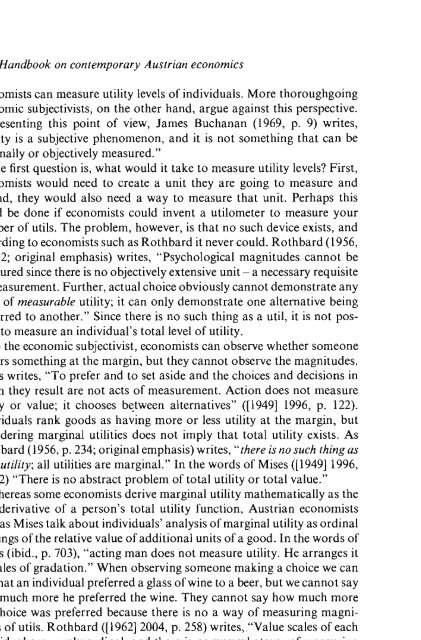Handbook on Contemporary Austrian Economics
Handbook on Contemporary Austrian Economics
Handbook on Contemporary Austrian Economics
You also want an ePaper? Increase the reach of your titles
YUMPU automatically turns print PDFs into web optimized ePapers that Google loves.
50 <str<strong>on</strong>g>Handbook</str<strong>on</strong>g> <strong>on</strong> c<strong>on</strong>temporary <strong>Austrian</strong> ec<strong>on</strong>omics<br />
ec<strong>on</strong>omists can measure utility levels of individuals. More thoroughgoing<br />
ec<strong>on</strong>omic subjectivists, <strong>on</strong> the other hand, argue against this perspective.<br />
Representing this point of view, James Buchanan (1969, p. 9) writes,<br />
"utility is a subjective phenomen<strong>on</strong>, and it is not something that can be<br />
externally or objectively measured."<br />
The first questi<strong>on</strong> is, what would it take to measure utility levels First,<br />
ec<strong>on</strong>omists would need to create a unit they are going to measure and<br />
sec<strong>on</strong>d, they would also need a way to measure that unit. Perhaps this<br />
could be d<strong>on</strong>e if ec<strong>on</strong>omists could invent a utilometer to measure your<br />
number of utils. The problem, however, is that no such device exists, and<br />
according to ec<strong>on</strong>omists such as Rothbard it never could. Rothbard (1956,<br />
p. 232; original emphasis) writes, "Psychological magnitudes cannot be<br />
measured since there is no objectively extensive unit - a necessary requisite<br />
of measurement. Further, actual choice obviously cannot dem<strong>on</strong>strate any<br />
form of measurable utility; it can <strong>on</strong>ly dem<strong>on</strong>strate <strong>on</strong>e alternative being<br />
preferred to another." Since there is no such thing as a util, it is not possible<br />
to measure an individual's total level of utility.<br />
To the ec<strong>on</strong>omic subjectivist, ec<strong>on</strong>omists can observe whether some<strong>on</strong>e<br />
prefers something at the margin, but they cannot observe the magnitudes.<br />
Mises writes, "To prefer and to set aside and the choices and decisi<strong>on</strong>s in<br />
which they result are not acts of measurement. Acti<strong>on</strong> does not measure<br />
utility or value; it chooses b~tween alternatives" ([1949] 1996, p. 122).<br />
Individuals rank goods as having more or less utility at the margin, but<br />
c<strong>on</strong>sidering marginal utilities does not imply that total utility exists. As<br />
Rothbard (1956, p. 234; original emphasis) writes, "there is no such thing as<br />
total utility; all utilities are marginal." In the words of Mises ([1949] 1996,<br />
p. 122) "There is no abstract problem of total utility or total value."<br />
Whereas some ec<strong>on</strong>omists derive marginal utility mathematically as the<br />
first derivative of a pers<strong>on</strong>'s total utility functi<strong>on</strong>, <strong>Austrian</strong> ec<strong>on</strong>omists<br />
such as Mises talk about individuals' analysis of marginal utility as ordinal<br />
rankings of the relative value of additi<strong>on</strong>al units of a good. In the words of<br />
Mises (ibid., p. 703), "acting man does not measure utility. He arranges it<br />
in scales of gradati<strong>on</strong>." When observing some<strong>on</strong>e making a choice we can<br />
say that an individual preferred a glass of wine to a beer, but we cannot say<br />
how much more he preferred the wine. They cannot say how much more<br />
the choice was preferred because there is no a way of measuring magnitudes<br />
of uti Is. Rothbard ([ 1962] 2004, p. 258) writes, ,"Value scales of each<br />
individual are purely ordinal, and there is no way whatever of measuring<br />
the distance between the rankings; indeed, any c<strong>on</strong>cept of such distance<br />
is a fallacious <strong>on</strong>e." In this perspective, utility is ordinal not cardinal. A<br />
good might provide marginal utility, but we cannot measure levels of total<br />
utility because there is no such thing as a "util."

















